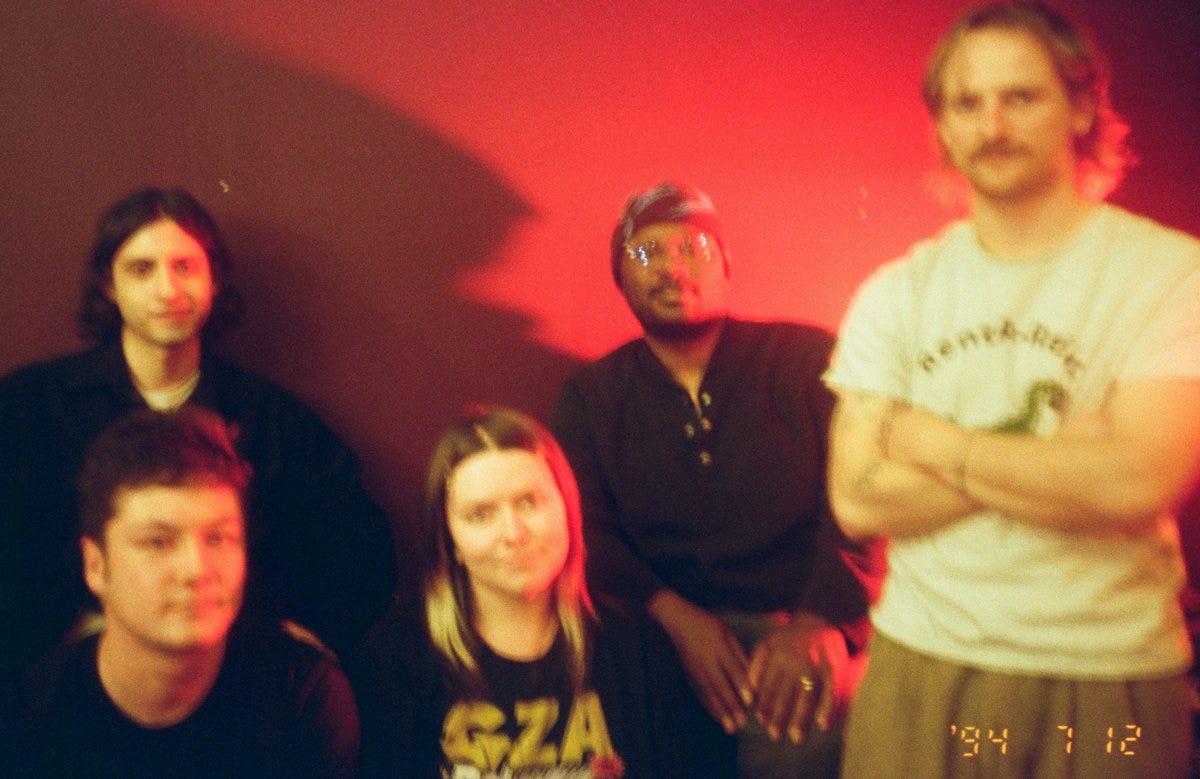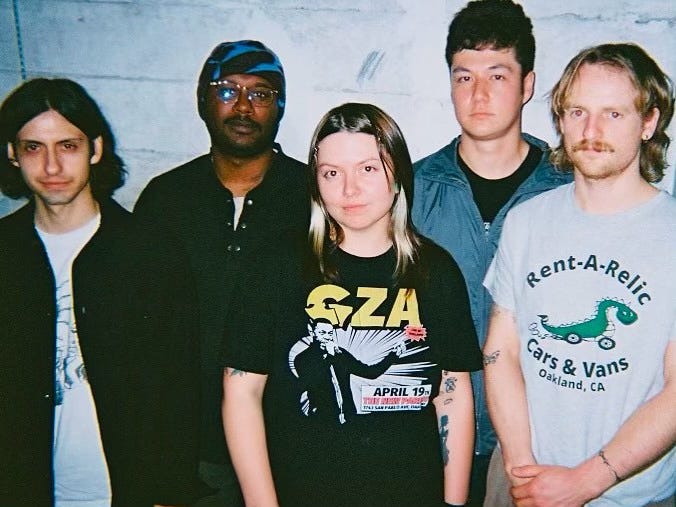New band alert: Softie
Four years must feel like a lifetime for a musician when it comes to putting out new music. In 2021, under the moniker Softie, Nicholas Coleman released his debut EP, Strong Hold, a bewildering collection of lo-fi bedroom recordings. The five songs sound as if they were recorded underwater (which is good!), twisting and wandering in dithering pathways that recall the fog-thick droning of early Flying Saucer Attack, Grouper’s A I A: Dream Loss or Duster’s Transmission, Flux (also good!).
Now Coleman has returned with a new Softie EP, Somersault, of which the project’s dynamic veers more towards a louder and mettlesome approach. In his bio, it notes that Strong Hold was “steeped in boredom and burning melancholy, [whereas Somersault] embraces a revitalized energy and vibrance.” This change seems to be the result of recording more like a band than just one person. Featuring members of Buddy Junior, Figure Eight, Slugfeast, Christina’s Trip, Fitting, My Pet Fossil, and H. Salt, Coleman has killed off some of that slacker-ish, bedroom vibe for a full-on, blast of explosive, melodic noise that offers something new for those eager to hear more sounds materialize from the shoegaze scene.
How would you say SOMERSAULT differs from your first EP?
Strong Hold started out as a solo “COVID baby” — a project born out of the stillness and solitude that defined those early lockdown days. It was rooted in the quiet, a way of channeling the isolation and uncertainty of that time. Without any expectations or outside pressure, I gave myself space to explore what it would be like to make music completely on my own. It was more about curiosity than ambition—just seeing what might come out when I gave myself permission to create for no one but myself.
The early songs were personal, raw, and often written late at night. I played a few solo shows once things started opening back up, and eventually, a few friends who I’d crossed paths with musically offered to be part of the project. That’s when things started to shift. The sound opened up and the songwriting naturally evolved.
With Somersault, the intention felt different. I wasn’t just experimenting anymore I had a clearer vision for what I wanted to express and how I wanted it to sound. It became less about exploring whether I could do it and more about trying to fully capture the feeling of the songs I was hearing in my head. There was still collaboration, but it was shaped around a more focused artistic direction. In some ways, Strong Hold began with a question; Somersault felt like an indirect answer.
It’s been four years since you put out Strong Hold. What have you been up to since then?
Since releasing the first EP, life has been full and constantly shifting. I’ve been writing steadily throughout it all, even if the pace hasn’t always been consistent. After the EP came out, I spent six months living in Oslo, which was both a pause and a reset — physically and creatively. The change of scenery gave me space to think and reflect, and I ended up writing a lot while I was there, mostly alone and without much pressure. It felt like a quiet incubation period for what’s to come.
When I returned to the U.S., there were a lot of transitions. The lineup of the band shifted — some members left, new ones joined — and that kind of change takes time to settle into. I also spent a while experimenting with recording methods, trying to figure out the best way to capture the new material. It’s definitely been a process of trial and error, learning as I go.
On top of that, I joined another band, started grad school, and got married — all beautiful things, but also incredibly time-consuming. I’ve been staying busy in almost every area of life, which sometimes makes it hard to find space for music, but I’ve made a point to keep writing through it all. It’s important to me not to let another four years pass between releases. A good portion of the next record is already written, and I’m finally starting to feel like the pieces are falling into place.
I spoke to a fellow Oaklander Tanukichan last fall. How would you describe the city’s music scene? Is there a big shoegaze community you feel part of in the city or the Bay Area? I know San Francisco has a strong scene.
The music scene in Oakland is eclectic, diverse, and, inclusive. There's a real sense of openness whether it’s in the sounds being explored or the people showing up to participate.
There’s also a conscious resistance to being boxed in by genre especially when it comes to shoegaze. While a lot of bands might have swirling guitars or ethereal vocals, people in the scene are pushing against being labeled strictly as “shoegaze”. It feels like folks are more interested in blending influences than adhering to them, and the result is this ever-evolving mix of sounds that feels alive and unfiltered.
Another thing that stands out is how interconnected everything is. Most people play in multiple bands, or they’re running DIY labels, booking shows, doing sound, printing zines, or creating visuals. That kind of cross-pollination builds a real sense of support and mutual respect. It’s not competitive it’s collaborative. Everyone’s just trying to lift each other up and contribute to something bigger.
Okay, random sports question. What are your thoughts on the Athletics leaving Oakland for Sacramento/Las Vegas?
I’m not all that bothered by it, to be honest. I went to a few games as a kid, and I can appreciate the atmosphere the snacks, the crowd energy, and the rhythm of the game, but baseball was never really my thing. It just didn’t click for me the way it does for some people. I’m more of a basketball fan. That said, I do have a soft spot for baseball history. There’s this section in Ken Burns’ Baseball documentary that covers the 1989 World Series between the A’s and the Giants. That part always stuck with me. Maybe it’s because it wasn’t just about the game — it was about the city, the tension, and the unexpected chaos of the earthquake. It felt like this strange intersection of sports and real-life upheaval.
How did Softie form?
We all met each other in the music scene in or around the Bay Area. It wasn’t one single moment or event, it was more like a gradual weaving of paths crossing at different points in time. At one time or another, we ended up playing shows together in other bands, sharing stages at house gigs, DIY spaces, or small venues, and slowly became familiar faces to one another. That kind of thing happens a lot in local scenes, people move around between projects, fill in on different instruments, or end up on the same bill just by coincidence. Over time, those connections deepened, and we naturally started collaborating more seriously. It felt organic. There was already a sense of mutual respect and appreciation for what each of us brought musically, and eventually that turned into friendship and then into forming something of our own.
What would you say are your influences?
U2, Swervedriver, The Brian Jones Town Massacre and Ringo Deathstarr.
How did you discover shoegaze?
I think skate videos.
What is your favourite shoegaze band?
Pry and Shallow, an amazing contemporary shoegaze band from Montreal.
What is your food of choice while recording?
Tacos or burritos.
Are there any TV shows the band watches together?
I don’t think we have ever watched TV together but we talk about Wong Kar-Wai often.
What album is most played when the band is hanging out together or on tour?
Name an activity the band does together outside of music?
Talk about basketball.
Where did your band’s name come from?
I was in a weird emotional place when I was recording the first record. Softie felt like a silly self-deprecating diss. At the time I did not realize there was an indie duo called The Softies. I doubt they are concerned about the similarity.
What other names did you consider for your band?
I was considering Crush or Crusher, which are much better names, but they were taken by some semi-established bands.
What is the hardest part of being a band?
Scheduling. We’re all in multiple bands and work full-time.
What is the best part of being a band?
Shutting out the responsibilities outside of music.
Name another band from Oakland that fans of Softie should know about.
Spa and Pocket Full of Crumbs.
If you had to pick only one subgenre listed on your Bandcamp page to describe your music which would it would be?
Slacker rock.
What are most of your lyrics about?
Lyrics usually take the shape of open-ended streams of consciousness, almost like journal entries filtered through melody. I tend to write about the quiet, in-between moments mundane day-to-day stuff like boredom, isolation, and the complexities of relationships. Those themes might seem small or simple on the surface, but they carry a kind of emotional weight that builds over time. I find a lot of meaning in the ordinary waiting for a text that never comes, walking around aimlessly, overthinking something someone said.
The lyrics don’t always follow a strict narrative or linear structure; they’re more about capturing a feeling, a snapshot of a moment, or the internal monologue that runs quietly in the background. I like leaving things a little ambiguous so listeners can project their own experiences onto the songs.
For example, in one song I recently wrote, the line goes: “crash my car into a setting sun/ just to get away from everyone.” It’s simple, but it says a lot about feeling disconnected or overwhelmed. That kind of imagery speaks louder to me than being overly specific.
What is your favourite venue to play?
What is your favourite record shop in the world?
What is your favourite Oakland band of the 1990s?






